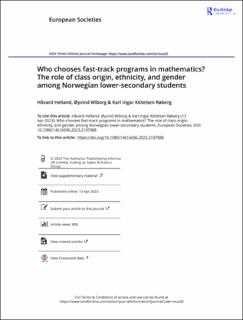Who chooses fast-track programs in mathematics? The role of class origin, ethnicity, and gender among Norwegian lower-secondary students
Peer reviewed, Journal article
Published version
Permanent lenke
https://hdl.handle.net/11250/3097392Utgivelsesdato
2023Metadata
Vis full innførselSamlinger
- AFI Notat [45]
- Publikasjoner fra Cristin [3269]
- SPS - Documents [424]
Sammendrag
This article examines Norwegian lower-secondary students who enrol in fast-
track programs in mathematics. These fast-track programs are designed to
accommodate high-performing students who want a faster learning pace
than the average student. In general, both educational performance and
choice depend on class origin, ethnicity, and gender, according to research.
Therefore, in studying the probability of entering the fast track, we focus on
the role played by class origin, ethnicity, and gender. Our findings suggest
that class origin and ethnicity affect students’ choice to enter the fast track or
not, but after accounting for their prior performance on national tests in 8th
grade the initial differences are considerably smaller. There are no differences
in this choice between boys and girls. Our analyses rely on high-quality
Norwegian administrative register data on 10th-grade students from 2010 to
2014.

